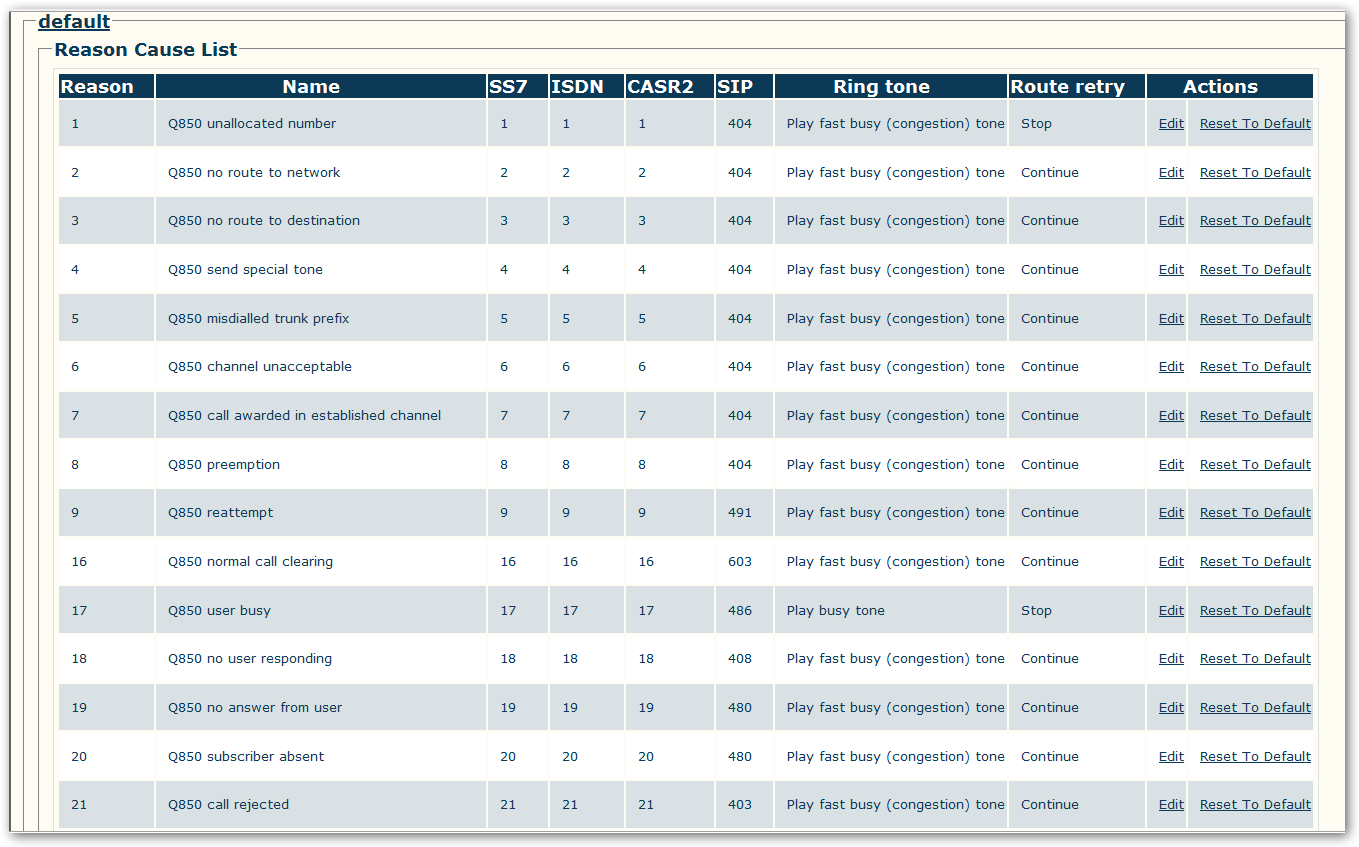Termination cause codes
From TBwiki
Revision as of 11:48, 29 January 2014 by Luc Morissette (Talk | contribs)
Starting from release 2.5.55 these cause codes can be modified with the Web portal in
Profiles -> Edit -> Reason Cause Mapping
Complete list of Reason Cause mapping between the protocols:
Specific internal Toolpack errors:
TBCMC_CALL_REASON_CODE_TOOLPACK_NORMAL = 200, TBCMC_CALL_REASON_CODE_TOOLPACK_RESOURCE_ERROR = 201, TBCMC_CALL_REASON_CODE_TOOLPACK_TIMEOUT = 202, TBCMC_CALL_REASON_CODE_TOOLPACK_NO_ROUTE = 203, /* Failed to find route to bridge with */ TBCMC_CALL_REASON_CODE_TOOLPACK_CALL_COLLISION = 204, /* Failed because a call collision occured */ TBCMC_CALL_REASON_CODE_TOOLPACK_SYNC_DROP = 205, /* Re-sync, but call was incomplete and had to be dropped */ TBCMC_CALL_REASON_CODE_TOOLPACK_SIGNALING_ERROR = 206, /* Error reported by signaling protocol */ TBCMC_CALL_REASON_CODE_TOOLPACK_LOCALLY_REJECTED = 207, /* Rejected by Toolpack Engine application */ TBCMC_CALL_REASON_CODE_TOOLPACK_INTERFACE_NOT_AVAILABLE = 208, /* Failed because the signaling interface is unavailable */ TBCMC_CALL_REASON_CODE_TOOLPACK_RESET_IN_PROGRESS = 209, TBCMC_CALL_REASON_CODE_TOOLPACK_ADAPTER_REJECT = 210, TBCMC_CALL_REASON_CODE_TOOLPACK_MISSING_INVALID_IE = 211, TBCMC_CALL_REASON_CODE_TOOLPACK_INCOMING_ONLY = 212, TBCMC_CALL_REASON_CODE_TOOLPACK_SYSTEM_CONFIGURATION_CHANGED = 213, TBCMC_CALL_REASON_CODE_TOOLPACK_RESOURCE_NO_MORE_AVAILABLE = 214, /* Resource is down (adapter no more ready) */ TBCMC_CALL_REASON_CODE_TOOLPACK_INCOMPATIBLE_MEDIA = 215, /* Failed because of media incompatibility */ TBCMC_CALL_REASON_CODE_TOOLPACK_RES_ALLOC_FAILED = 216, /* Failed to allocate data path resources for the call */ TBCMC_CALL_REASON_CODE_TOOLPACK_DATA_PATH_NOT_AVAILABLE = 217, /* Data path failure (could be because of unreacheable TDM path or some HW failure) */ TBCMC_CALL_REASON_CODE_TOOLPACK_LOCAL_CONGESTION = 218, /* Congestion in the Toolpack system */ TBCMC_CALL_REASON_CODE_TOOLPACK_AUTHORIZATION_REQUIRED = 219, /* Authorization required on call - this is used internally and should never reach signaling */ TBCMC_CALL_REASON_CODE_TOOLPACK_DIVERT_NOT_ALLOWED = 220, /* Call divert is not allowed */
Case for the 603 DECLINE and 200 TOOLPACK NORMAL
The TOOLPACK_NORMAL reason code is mapped to the 603_DECLINE reason code. The reason is the following:
A SIP BYE does not include a cause code, so on normal call terminations, So TMedia will send a BYE on SIP, and internally, a 200 TOOLPACK_NORMAL (in the logs and the CDRs). But when the call terminates unexpectedly, for example after a ACM, but before a ANM, Tmedia will still send a BYE on SIP, but internally, it will log a 603 Decline (REASON_CODE_603_DECLINE).
